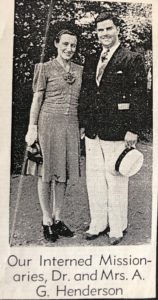

Just Say No
Next month, I’ll be giving a talk in Monterey about my Uncle Fred and Aunt Jamie Henderson, who were captured by the German navy in April 1941 on their way to Africa to be medical missionaries. It’s titled “Surviving the Zam Zam.”
In 1993, I interviewed Uncle Fred about his experiences. That was fortunate because he died a year later. In the interview, I thought we had covered everything interesting about his capture, his work as a doctor in a German P.O.W. camp, and his escape to Switzerland from a prison camp in occupied France. So I turned to another question. We had grown up with a story from our parents and I wanted to see if it was true. I thought it had nothing to do with his time in the prison camp. I was wrong.
Here’s the segment from the interview.
DRH: Another story I remember hearing my parents tell, I think. The St. Charles Country Club is near here?
Fred: Yes.
DRH: Yes. You were a golfer and you were thinking of joining but you found out that they woudn’t accept Jews. And you refused to join because they discriminated against Jews. Is that true?
Fred: Yeah.
DRH: Yeah. That’s neat.
Then Uncle Fred paused and looked pensive. As you’ll see, I think the incident reminded him of why he was so opposed to anti-semitism.
Fred: I can remember in the German prison camp we had sick parade every morning and the German doctor [who supervised Uncle Fred] would often say to the people coming up for medical treatment “Sind sie Jude?” “Are you a Jew?” Hitler of course was against the Jews. I had to get the Swiss Protecting Power to get the German doctor to promise that he wouldn’t ask whether they were Jews or not.
DRH: Oh, wow. This was where?
Fred: In the (garbled name) the German prison camp.
DRH: So you actually got the German doctor not to ask that?
Fred: Yeah.
DRH: How did you do that?
Fred: Because the Swiss Protecting Power could get the German doctor to promise that.
DRH: In a prison camp in Germany? [Actually Poland, but that distinction didn’t matter to Hitler.]
Fred: Yeah.
DRH: That’s neat. I didn’t know that. I had no idea. I thought once you were in a prison camp and you were Jewish, that was it. So you just said no. This is not right and I’m going to protest.
Fred: Yeah.
DRH: That’s wonderful. You probably saved some lives.

READER COMMENTS
Jerry Brown
Oct 29 2021 at 1:31am
Your Uncle was a prisoner himself? That takes some kind of courage. It is a great story. It can be very scary to point out to someone who has overwhelming force on their side that they are doing something wrong. Even if they are not Nazi Germany evil. But sometimes it works and you definitely feel better about yourself for trying. But I don’t know if I would have the courage in that horrible situation. Hope I never have to find out that answer.
David Henderson
Oct 29 2021 at 10:24am
Yes, he was a prisoner from April 17, 1941 to November 1943, when he escaped to Switzerland. My aunt was a prison from April 17, 1941 to June 1942. She and some other Canadian women were held under house arrest in Berlin for the 8 months prior to June 1942.
I hope I would have the courage he had too. Moreover, I think I would. By the time the Swiss Protecting Power came around, he probably had seen that various parts of the Geneva Conventions were being complied with.
MarkW
Oct 29 2021 at 11:33am
Do you know if the incident happened before or after the U.S. entered the war? I can imagine quite different treatment from the German authorities in early 1941 rather than late 1943 (at which point the ‘Final Solution’ was underway and Germany was clearly losing the war).
David Henderson
Oct 29 2021 at 2:12pm
I don’t. He didn’t give me a date.
zeke5123
Oct 29 2021 at 3:17pm
I am guessing your Uncle was also Canadian? Canada had been in the war for some time at that point.
David Henderson
Oct 29 2021 at 4:04pm
zeke5123,
Yes. He was born and bred in Winnipeg. That’s why they and the other Canadians were taken prisoner for so long. The Americans on the ship, on the other hand, were released after the hellish weeks and weeks on board the Dresden.
Phil H
Oct 30 2021 at 2:45am
That’s a beautiful story.
One of the themes that often comes up here is that private discrimination does not necessarily have to be legislated against, because the market has powerful anti-discrimination effects. I like the argument, but I think this story helps to illustrate why markets are not enough, and in some cases, there still needs to be explicit anti-discrimination legislation from the government as well.
David Henderson
Oct 30 2021 at 12:16pm
You wrote:
Thanks.
You wrote:
I think that’s a bizarre statement to make in this context. This was Hitler’s Germany. The vast majority of people who opposed him would have had most of their wishes fulfilled if he had ended the most extreme government discrimination against Jews, gypsies, homosexuals, and others: he murdered them and so, if he had stopped murdering them, that would have been fantastic.
Comments are closed.